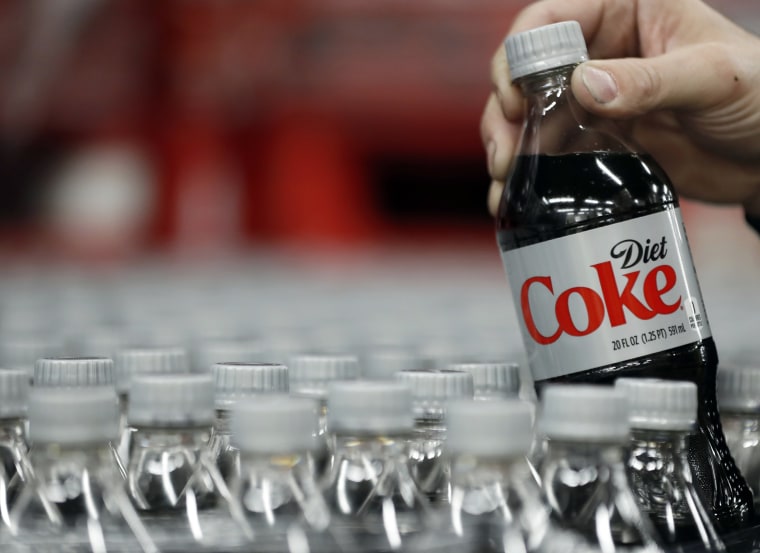The World Health Organization’s International Research Agency on Cancer announced Thursday that the artificial sweetener aspartame, commonly found in Diet Coke and other sugar-free foods, is a possible carcinogen.
However, a second WHO group, the Expert Committee on Food Additives, did not change its threshold for the daily amount of aspartame that is safe to consume: 40 milligrams per kilogram of body weight for adults who weigh about 154 pounds. Added up, that’s the amount in around 14 cans of Diet Coke. The Food and Drug Administration has a slightly higher daily limit of 50 milligrams per kilogram of body weight for an adult who weighs about 132 pounds.
“It’s a slight warning to people, but it’s not ‘do not consume,’” Barry Popkin, a professor of nutrition at the University of North Carolina Gillings School of Global Public Health, said of the WHO decision. “Consume moderate levels and you’re OK.”
Found in more than 5,000 foods and drinks, aspartame is far sweeter than sugar. In 1974, the FDA approved its use as a tabletop sweetener and ingredient in gum, cereals, instant coffee, dairy products and other items. Common foods and drinks with aspartame include:
- Tabletop sweeteners, including NutraSweet, Equal and Sugar Twin.
- Beverages and drink mixes, such as Diet Coke, Coke Zero, Diet Snapple, Fanta Zero, Sprite Zero, Crystal Light and Wyler’s Light.
- Sugar-free gum, including Trident, Extra, Wrigley’s and Mentos gum.
- Gelatin-based products, including sugar-free Jell-O and Royal Gelatin.
- Syrups, including Mrs. Butterworth’s Sugar Free Syrup and Log Cabin Sugar Free Syrup.
Following the WHO announcement, the FDA said in a statement that it “disagrees with IARC’s conclusion.”
“FDA scientists do not have safety concerns when aspartame is used under the approved conditions,” the agency said.
What the research says about cancer risk and aspartame
The WHO placed aspartame in a risk category below two others: “carcinogenic to humans” and “probably carcinogenic.” Other substances in the “possible carcinogen” category include aloe vera, pickled vegetables and nickel.
Past research on aspartame’s link to cancer has not yielded conclusive evidence that it causes the disease, and many studies investigating links between cancer and artificial sweeteners have relied on animals, not humans, Popkin said.
A 2020 study, for example, found an increased incidence of leukemia and lymphoma in mice that consumed aspartame — but the doses were almost quadruple the weight of the mice, Popkin said, which makes them a poor point of reference for human risk. Meanwhile, studies from the 1980s found aspartame did not cause brain tumors or bladder cancer in rats.
A 2022 study of more than 100,000 adults in France, however, found that consuming large amounts of artificial sweeteners was linked to a slightly higher risk of cancer.
Artificial sweeteners may bring other health risks
Though the WHO’s announcement may seem to imply that aspartame is worse than other artificial sweeteners, Popkin said, all could be linked to negative health effects.
“Frankly, I think it’s so trivial a difference that all diet sweeteners should be treated equally,” Popkin said. “But if you’re consuming 10 Diet Cokes or 10 Diet Pepsis in a day, you shouldn’t. You have to cut down, because that’s way in excess, and that moves toward potential carcinogen levels.”
Past research has linked artificial sweeteners to a higher chance of heart disease, high blood pressure, diabetes and obesity.

In May, the WHO advised against consuming artificial sweeteners as a weight-loss strategy, since they have not been found to reduce body fat long-term.
“If you’re drinking 32 ounces, 64 ounces of soda a day, it’s likely better to have these artificially low-caloric sweeteners than to be drinking that much added sugar,” said Dariush Mozaffarian, a professor of nutrition at Tufts University. “On the other hand, I wouldn’t think of these as just blanket 100% safe. I would avoid them as much as possible.”
The 2022 study in France found that people who consumed aspartame were at increased risk of stroke, and that replacing added sugar with artificial sweeteners did not lower the risk of heart disease.
In another study published last year, Israeli researchers found that artificial sweeteners altered the participants’ populations of gut microbes.
“It’s best to eat a natural, healthy diet with naturally sweet foods,” Mozaffarian said. “So I think of these artificial sweeteners as a bridge away from very high doses of added sugar but not necessarily a safe switch.”
CORRECTION (July 14, 2023, 5:55 p.m. ET): A previous version of this article misstated the WHO’s recommended limit for aspartame consumption. It is 40 milligrams per kilogram of body weight, not 40 milligrams total.






